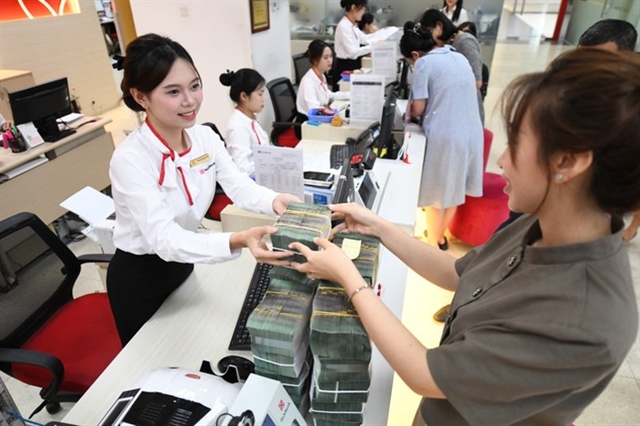 Economy
Economy


|
| Credit institutions said they are facing difficulties in handling bad debts due to the expiry of Resolution No. 42/2017/QH14, and they expect that the legal corridor for handling bad debt will be completed. VNA/VNS Photo |
HÀ NỘI — The State Bank of Vietnam (SBV) late last week released a draft law amending and supplementing a number of articles of the Law on Credit Institutions.
According to the SBV, it is necessary to amend the Law to meet urgent requirements for institutional improvement and ensure the safety of the banking system.
“The amendment and supplementation of the Law on Credit Institutions is aimed to include a number of provisions of Resolution No. 42/2017/QH14 into the law to timely remove institutional bottlenecks and obstacles in handling bad debts, contributing to unblocking capital sources and improving the safety of the credit institution system,” the SBV states in a report released last Friday.
According to the SBV, Resolution No 42/2017/QH14 on piloting bad debt settlement of credit institutions, which was issued in 2017 and expired at the end of 2024, created conditions for credit institutions to effectively manage bad debts, including the collateral assets of real estate projects.
Credit institutions say they are facing difficulties in handling bad debts due to the expiry of the Resolution and want the legal corridor for handling bad debt to be completed.
“Credit institutions are facing potential bad debt risks because Resolution No 42/2017/QH14 has expired. A lack of a complete legal framework related to restructuring credit institutions and handling bad debts will challenge credit institutions in settling bad debts,” Deputy Chairman of the Vietnam Banks Association Nguyễn Quốc Hùng, said.
According to Hùng, the recovery of bad debts is challenging since many borrowers haven’t cooperated with credit institutions to repay their debts. Some even intentionally did not service their debts, which has affected the process of restructuring and handling bad debts.
Under the draft law, some of Resolution No. 42/2017/QH14’s provisions clarify the right to seize collateral, the attachment of collateral of the party subject to enforcement and the return of collateral as evidence in criminal cases, which have been proved to be effective since the resolution took effect.
The draft law also amends that the SBV will be authorised to decide on special loans with an interest rate of zero per cent per year, and special loans without collateral, instead of the Prime Minister making that decision, as is currently the case.
According to the SBV, in addition to strengthening the role and the responsibility of Government members, the amendment is to thoroughly authorise the SBV in deciding on special loans to ensure the implementation is timely, effective, feasible and safe.
The amendment and supplementation will also aim to help the Vietnamese law comply with international treaties to which Việt Nam is a member, ensuring the goal of international integration and in line with development trends.
According to the SBV, the increasing trend of a bad debt ratio is putting pressure on the banking sector, especially in the current context that 2025 is identified as the year of acceleration and breakthrough to reach the Government’s goals set for the 2021-2025 period.
The SBV attributed the increases in bad debt to the situation of both the global and domestic economy, the slow recovery of the stock, bond and real estate markets, the marginal development of the debt trading market, the expiry of Resolution No. 42/2017/QH14 and the inadequate management capacity of some credit institutions.
“In the context that Việt Nam aims for economic growth of eight per cent this year, the amendment and supplementation of the law plays a key role in creating new momentum, supporting businesses and people to access credit at reasonable costs, and strengthening macroeconomic stability,” the SBV said. — BIZHUB/VNS




